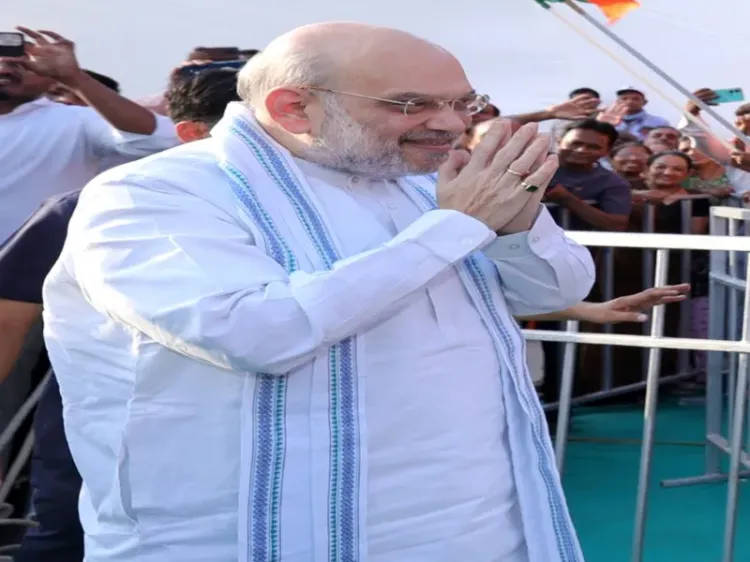Is Operation Sindoor a Milestone in India’s Security Strategy?

Synopsis
Key Takeaways
- Operation Sindoor signifies a transformative approach to national security.
- Indian forces successfully dismantled terror networks in Pakistan.
- Over 100 terrorists were neutralized during the operation.
- India's air defense systems proved effective against potential threats.
- Ethical considerations were upheld during military actions.
Gandhinagar, May 17 (NationPress) Home Minister Amit Shah, during a two-day trip to his native state of Gujarat, stated on Saturday that Operation Sindoor has initiated a significant transformation in India’s approach to national security. He highlighted that under the decisive guidance of Prime Minister Narendra Modi, Indian armed forces penetrated deeply into Pakistani territory, effectively dismantling terrorist networks.
“For the first time since independence, our forces crossed 100 km into Pakistan and annihilated terror camps located in places like Muzaffarabad, Kotli, Bahawalpur, and Muridke — our message resonated loudly. The world observes with admiration while Pakistan quakes in fear,” HM Shah remarked during a gathering in Gandhinagar.
Throughout his visit, HM Shah inaugurated and laid the groundwork for development projects worth Rs 702 crore in the Gandhinagar Lok Sabha constituency, emphasizing the dual focus on national security and local advancement. Unyielding Response to Pahalgam Assault In reference to the heinous terrorist attack in Pahalgam, which targeted civilians and tourists based on their faith, Shah asserted that India's response was driven by both principle and might.
“Terrorists from Pakistan perpetrated a ghastly attack, compelling people to disclose their religion and subsequently executing them before their families. It was a barbaric act — and India responded, not with vengeance, but with determination and righteousness,” asserted Home Minister Shah.
He disclosed that Operation Sindoor was India’s direct military response to that incident, leading to the destruction of major terror organizations' command centers, including those belonging to Jaish-e-Mohammed and Lashkar-e-Taiba, as well as nine other training camps in Pakistan and Pakistan-occupied Jammu and Kashmir.
“We turned their entire network into ruins — arms caches, training facilities, and hideouts. More than 100 terrorists were neutralized,” he stated.
Home Minister Shah revealed that Pakistan did not retreat even after the initial operation.
On May 8, the Pakistani military launched coordinated strikes across India’s western border, from Kutch to Kashmir.
“However, under Prime Minister Modi, our air defense systems have advanced to the point where not a single missile or drone could breach Indian territory,” he praised the technological readiness of Indian forces.
On May 9, India retaliated with precise strikes on 15 Pakistani military installations, including vital airbases like Noor Khan, Sargodha, Sukkur, and Malir Cantonment in Karachi.
Significantly, HM Shah emphasized that civilian areas were spared, demonstrating India's commitment to ethical warfare.
“We didn’t target civilians. But we conveyed a clear message -- if you harm Indians, the response will be fierce and focused.”
HM Shah attributed the shift in India’s counter-terrorism strategy to the leadership of Prime Minister Modi since 2014.
“Before 2014, terror attacks from Pakistan were often met with silence. That era has ended. Today, every act of aggression is met with strength,” he remarked. Citing earlier operations such as the surgical strikes after Uri and airstrikes post-Pulwama, Shah placed Operation Sindoor in a continuum of robust military responses.
He stressed that this operation has captured the attention of global military experts. “Our missile strikes have showcased surgical precision. International defense analysts are now observing India’s capabilities with renewed respect,” he stated.
According to Home Minister Shah, Operation Sindoor was the result of precise intelligence coordination, operational excellence, and unwavering political leadership.
“This was not merely a military maneuver. It was a manifestation of our Prime Minister’s will, our agencies’ intelligence coordination, and the unmatched readiness of our armed forces,” he stated.
He asserted that India's capabilities have now neutralized Pakistan’s offensive potential.
“After neutralizing over 100 hardened terrorists, we didn’t cease our actions. We targeted the roots of their offensive power — their air bases. And we ensured they understood: India will not tolerate violence against its citizens,” the Home Minister concluded.










